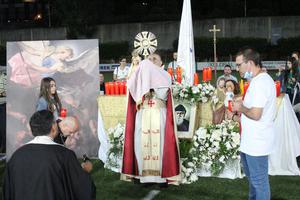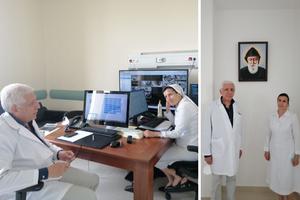A Saint’s Mission for Saving Souls Is Reborn in Lebanon
Church dedicated this summer draws the faithful to honor Italian-born St. Veronica Giuliani.
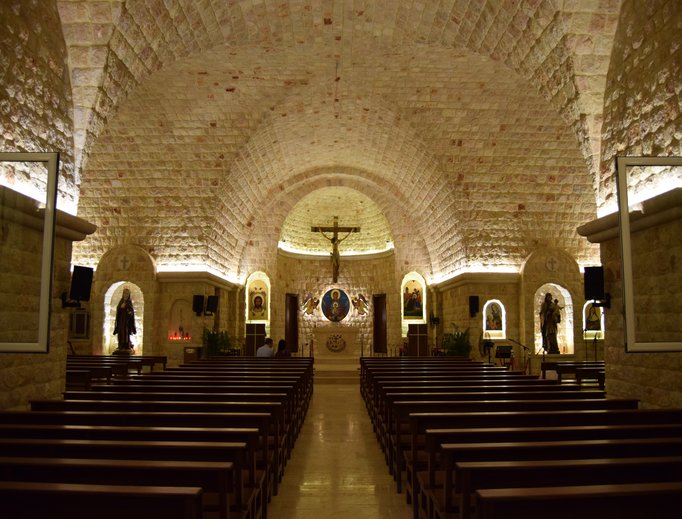
KSAIBE, Lebanon — “A saint rises up in Lebanon!” proclaimed banners throughout the country, heralding the first church in the world outside of Italy dedicated to St. Veronica Giuliani.
The little-known Italian saint’s path to adoption by Lebanon, which already has three native saints — Charbel/Sharbel, Rakfa and Hardini — is considered part of a providential plan to renew her mission of saving souls.
The newly built church, in Ksaibe, Lebanon (located about a 30-minute drive east of Beirut), was consecrated on July 9, the saint’s feast day.
“It’s a great pleasure to be here among you to inaugurate this church, representing the Pope,” said Archbishop Gabriele Caccia, the Vatican nuncio to Lebanon, in his address during the Mass. “And my presence means the blessing of Pope Francis.” He pointed out that it was a global event, characterized by delegations from foreign countries joining Lebanese believers.
St. Veronica’s “rebirth” in Lebanon began with the devotion of a Lebanese religious, Brother Emmanuel, who came upon her writings in 1994 while serving at a monastery in Deir al-Zour, Syria. That area is now under Islamic State control.
“I was astonished by what I read,” Brother Emmanuel told the Register. “I had a question: Why was this saint not known? I found the answer was more important than the question itself: Jesus told this saint that her writings and her life would remain in silence until the most difficult time in the Church and humanity.”
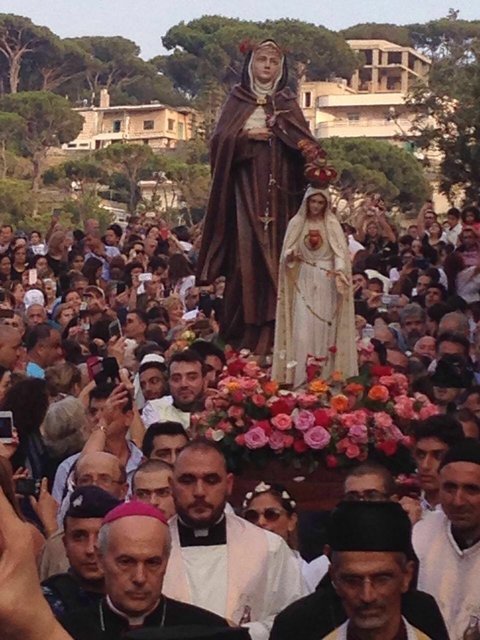
In the meantime, Brother Emmanuel was instrumental in founding an association, the Friends of St. Veronica Giuliani, in 2008 and a new religious order, the Little Servants of the Immaculate Heart of Mary, in 2015. Currently, there are seven nuns and four brothers in the order.
“This saint has chosen Lebanon as a country to begin, or to intensify, her mission because Lebanon loves Our Lady a lot and has a very deep relationship with Mary,” Brother Emmanuel said, adding that Mary herself said to St. Veronica, “You are my preferred child, and you are the heart of my heart.”
Although there was no formal fundraising committee, news of the planned church spread. Donations came in from Maronite Catholics and Christians in Lebanon as well as from the faithful around the world, in particular from Lebanese expatriates.
“We prayed for one and a half years to know where to build the church,” Brother Emmanuel said, adding, “I had a deep feeling this was a very important project for God and the Blessed Mother.”
Although three people offered land for the church, each in different regions of Lebanon, Brother Emmanuel said he “didn’t have the courage to choose the location.”
“So I said, ‘We will pray a novena. If God doesn’t make known the location, we will go to the patriarch to ask him,’” Brother Emmanuel recounted.
The Story of Maria Nakouzi
On the last day of the novena, Andre and Jean Nakouzi approached Brother Emmanuel with an offer of land.
It was through the death of their 21-year-old daughter Maria two years earlier that the couple discovered St. Veronica Giuliani and realized they, too, had a mission: to build a church for the saint in their native Lebanon.
Maria’s mother, Andre, refers to it all as a “story from heaven.”
“It’s a miracle. We feel the hand of God and the Virgin Mary in everything,” she told the Register. Reminiscing about her late daughter with a sweet smile, she added, “Ever since she was very young, we called her ‘Maria Mercy’ because of her lovely heart. She loved everybody, and she had so much mercy in her heart.”
When Maria was suffering from cancer, she told her parents that Jesus wanted her to be a victim soul for the conversion of young people who are far from God. Maria said Jesus revealed to her that she would suffer greatly for 15 months and then, the following year, on Good Friday, she would die. And that’s exactly what happened.
Andre recounted to the Register what her daughter said as she lay dying: “Mom, the Blessed Mother is looking at you, and she’s asking you to build a church for St. Veronica Giuliani in Lebanon. The Blessed Mother has wanted this church for the last 300 years.”
“I answered her, ‘I’m going to build a church? But how? Our family certainly doesn’t have the financial means,’” Andre recalled.
Maria answered her mother, “The Blessed Mother and I see a piece of land in a steep valley. Go to my grandfather and tell him about this land. He will give it to you, and you will build a church.” Andre told the Register that Maria didn’t have prior knowledge that her grandfather owned property in Ksaibe.
“What came to my mind was a small grotto, if anything,” Andre said.
Maria urged her, “Mom, close your eyes.”
“I closed my eyes, and I saw a big church,” Andre recounted. “I thought, ‘God help me. How am I going to start this?’ And I felt a voice from inside me saying, ‘The Blessed Mother and Maria want this church. Don’t say No to them.’”
The mother promised, and Maria died a few moments later. Maria now rests in a tomb on the grounds of St. Veronica Giuliani Church.
A banner, hanging above the tomb, is inscribed with a photo of Maria’s smiling face and her last message to her friends before her death: “Jesus loves the youth in a special way. Each one of you has been given a cup. He wants you to empty it from all your sins in the confessional and refill it with acts of love, mercy and prayer.”
Church Construction
Excavation of the property, located on a steep mountainside in Ksaibe, began in June 2014. The first part of the construction project — a convent for the Little Servants of the Immaculate Heart of Mary that would be adjoined to the church — was completed in October 2015.
Concrete and stone work for the church began in March 2016. All along, Brother Emmanuel believed that the church would be ready in time to be consecrated on July 9.
“The speed with which the church was built is like a miracle,” said Maronite Archbishop Camille Zaidan of Antelias, Lebanon, in his homily after consecrating the new church. The archbishop is a native of Ksaibe.
Typically, such a project would take three to four years. But those associated with the project cite divine intervention.
When speaking of the construction, those involved openly say, “God was helping us,” “It was by the help of the Blessed Mother,” or “St. Veronica Giuliani is working here.”
Aside from the mostly Syrian Muslim laborers, many of the men who came to work on the project had a devotion to Our Lady and were already committed to praying the Rosary.
Even a few of the skilled Muslim stoneworkers, witnessing the prayerful atmosphere and realizing that the pace at which the project was proceeding was not humanly possible, chose to convert.
Elie Madi, the project’s stonemason, did not use a blueprint or drawn plan to build the church.
“It was all in my mind,” said the 56-year-old Maronite Catholic.
But, he stressed, “I feel that this work was inspired by the Holy Spirit and Veronica — she was with me all the time, with the Blessed Mother.” He specified that he also constantly prayed for guidance and a good outcome, so that his work would reflect what the Blessed Mother and St. Veronica wanted.
All the work, with a small team of laborers — working from 7am until midnight — flowed smoothly, he added.
Speaking to the Register in the church the day before its consecration, Madi shared, “I feel a lot of love, maybe because I put all my feelings and love into each one of these stones.”
The church consists of 30,000 stones, each one hand-cut and fastened by hand. They were specifically chosen from a quarry in Deir el Ahmar in Lebanon’s Bekaa Valley, known for its red-toned rocks.
In the nine days leading up to the July 9 consecration of the church, Madi fasted on bread and water, while continuing to work 15-hour days to accomplish its completion.
“I feel such joy inside. When I look around, I just want to thank God,” he said, pausing between drilling altar rails into the marble floor, as his 25-year-old son Abboud assisted him.
All throughout the day before the consecration, the church buzzed with activity. Sisters and brothers from the order, along with volunteers, worked together like an orchestra in harmony, as they mopped floors, washed windows, dusted and moved pews into place; visitors occasionally streamed in to pray.
Outside, dozens of workers and volunteers were busy with final touches on the church and its grounds. Every detail had already been attended to for the church’s inauguration. Towering poles dressed with Vatican, Lebanese and Italian flags lined the building; signs were posted for outdoor confession stations; speakers were installed outdoors to broadcast the consecration and Mass; and flowers were planted in the Our Lady of Fatima Grotto facing the church entrance. In addition, banners of Lebanon’s saints draped the stone walls in which the grotto is encased; and there is a massive banner adorning the church entrance, imprinted with the image of the Sacred Heart of Jesus.
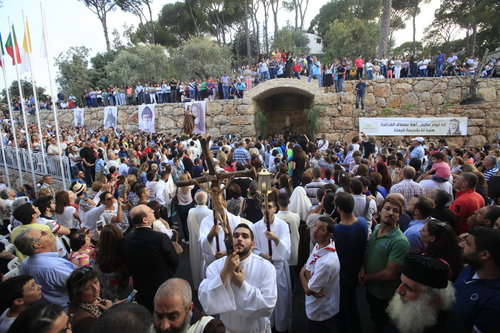
The Church Is Consecrated
The church’s bell — crafted in a bell foundry in Beit Chebab, Lebanon — signaled the start of the outdoor procession on July 9.
Escorted by a marching band, the nuncio, bishops, priests, Brother Emmanuel and other religious, the Nakouzis and believers, preceded by a crucifix and statue of Our Lady of Fatima, the life-size statue of St. Veronica Giuliani processed through the outdoor crowds, who greeted her with rejoicing and showers of rose petals. The procession led the statue inside the church, where it was placed in an alcove to the side of the altar, next to a reliquary of the saint’s relics.
“I hope this church becomes, with time, a place where we come and ask the grace to be healed: not only of physical illness, but also illness of the soul,” the Vatican nuncio said in his address.
“This is my wish: to renew our spiritual lives, the Church in Lebanon and the universal Church, through the intercession of St. Veronica Giuliani,” the nuncio said.
Syriac Catholic Archbishop Raboula Antoine Beylouni, curial bishop emeritus of Antioch, representing the Syriac Catholic Patriarch Ignace Joseph III Younan, said, “We hope St. Veronica Giuliani will be the patron saint” for this country and that, through her intercession, “the Lord will end the trials and tribulations of war, so that peace prevails in the world.”
Archbishop Beylouni also serves as spiritual director for the Friends of St. Veronica Giuliani.
Mrs. Nakouzi, also speaking following the Mass, praised her daughter Maria for her “tender and true love for Jesus” and for being a model of sacrifice.
Brother Emmanuel, in his talk, said he expects the church to be a “spiritual light” and a place to introduce more of the faithful to St. Veronica Giuliani. He also hopes it will become a center devoted to the Immaculate Heart of Mary. The church will later have continuous adoration of the Blessed Sacrament.
A 12-minute trailer of the film about St. Veronica was also presented at the conclusion of the Mass. Giovanni Zipperna, the director, gave a testimony about his deep conversion through his work on the film, scheduled for release in the fall in Arabic and Italian (later to be translated into five languages).
Register correspondent Doreen Abi Raad writes from Beirut, Lebanon.
INFORMATION
The church’s Facebook site (mostly in Arabic): Facebook.com/St-Veronica-Giuliani-Lebanon-
ST. VERONICA GIULIANI (1660- 1727)
- Canonized on May 26, 1893, by Pope Gregory XVI.
- Pope Pius IX, after reading St. Veronica Giuliani’s diary (22,000 pages, handwritten) said that she was not merely a saint, but a giant in holiness.
- “My God, here I am, ready for any suffering, as long as you convert it to all those who offend you,” St. Veronica Giuliani wrote in her diary.
- Keywords:
- doreen abi raad
- faith
- lebanon
- saints
- st. veronica giuliani







